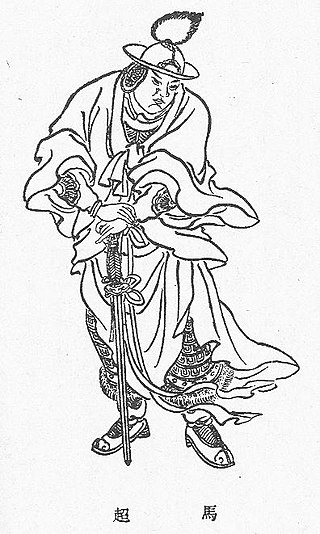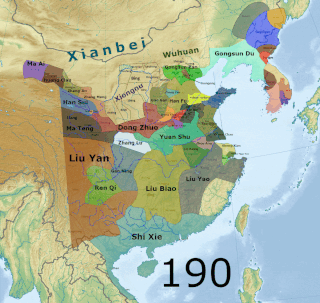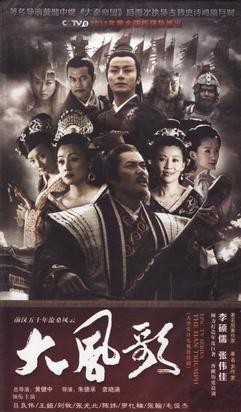
Ma Chao (176–222), courtesy name Mengqi, was a Chinese military general and warlord who lived in the late Eastern Han dynasty and early Three Kingdoms period of China. A descendant of the general Ma Yuan, Ma Chao was the eldest son of Ma Teng, a prominent warlord in Liang Province. In 211, he formed a coalition with Han Sui and other northwestern warlords and revolted against the Han central government, which was led by the warlord Cao Cao. The coalition broke up after losing the Battle of Tong Pass against Cao Cao's forces. Ma Chao initially retreated, but later returned to attack and seize control of Liang Province by killing the provincial inspector Wei Kang and forcing Wei Kang's subordinates to submit to him. About a year after Ma Chao started his uprising, Emperor Xian issued an imperial decree ordering the execution of Ma Chao's family members, who were in Ye city at the time. In the meantime, Wei Kang's subordinates, led by Zhao Ang, Yang Fu and others, rebelled against Ma Chao and forced him out of Liang Province. Ma Chao retreated to Hanzhong Commandery, where he borrowed troops from the warlord Zhang Lu, and returned to attack Liang Province but was ultimately defeated and driven back. Ma Chao took shelter under Zhang Lu for a while until around 214, when he heard that the warlord Liu Bei was fighting for control over Yi Province with Yi Province's governor, Liu Zhang. He defected to Liu Bei's side and assisted Liu Bei in capturing Yi Province from Liu Zhang. Ma Chao had served as a general under Liu Bei since then and participated in the Hanzhong Campaign in 219. He died in 222.

Xu Huang, courtesy name Gongming, was a Chinese military general serving under the warlord Cao Cao in the late Eastern Han dynasty of China. He later served in the state of Cao Wei during the Three Kingdoms period under the first two rulers, Cao Pi and Cao Rui, before his death at the start of Cao Rui's reign. Xu Huang is best noted for breaking the siege at the Battle of Fancheng in 219 by routing the enemy commander Guan Yu on the field.

Xiahou Yuan, courtesy name Miaocai, was a Chinese military general and politician serving under the warlord Cao Cao in the late Eastern Han dynasty of China. He is known for his exploits in western China in the 210s, during which he defeated Cao Cao's rivals Ma Chao and Han Sui in Liang Province and the surrounding areas, and forced several Di and Qiang tribal peoples into submission. He was killed in action at the Battle of Mount Dingjun while defending Hanzhong Commandery from attacks by a rival warlord Liu Bei. Xiahou Yuan's death was highly dramatised in the 14th-century historical novel Romance of the Three Kingdoms, in which he was slain by Liu Bei's general Huang Zhong during a surprise raid.

Han Sui, courtesy name Wenyue, originally named Han Yue, was a military general and minor warlord who lived during the late Eastern Han dynasty of China. For most of his life, he was active in Liang Province and was involved in several rebellions against the Han government and the warlord Cao Cao.

The military history of the Three Kingdoms period encompasses roughly a century's worth of prolonged warfare and disorder in Chinese history. After the assassination of General-in-chief He Jin in September 189, the administrative structures of the Han government became increasingly irrelevant. By the time of death of Cao Cao, the most successful warlord of North China, in 220, the Han empire was divided between the three rival states of Cao Wei, Shu Han and Eastern Wu. Due to the ensuing turmoil, the competing powers of the Three Kingdoms era found no shortage of willing recruits for their armies, although press-ganging as well as forcible enlistment of prisoners from defeated armies still occurred. Following four centuries of rule under the Han dynasty, the Three Kingdoms brought about a new era of conflict in China that shifted institutions in favor of a more permanent and selective system of military recruitment. This ultimately included the creation of a hereditary military class as well as increasing reliance on non-Chinese cavalry forces and the end of universal conscription.

Yue Jin, courtesy name Wenqian, was a military general serving under the warlord Cao Cao in the late Eastern Han dynasty of China. He was noted as much for his short stature as for his valour and ferocity on the battlefield. Yue Jin participated in most of Cao Cao's early military exploits, and gained multiple successes in the campaigns against Lü Bu, Liu Bei, remnants of the Yellow Turban rebels, and Yuan Shao and his associates. He was particularly praised as a capable vanguard, but his most famed accomplishment came with his supporting role in the defence of Hefei against Sun Quan's forces at the Battle of Xiaoyao Ford of 214–215.
Xiahou Mao, courtesy name Zilin, was a military general and marquis of the state of Cao Wei during the Three Kingdoms period of China. He was the second son of Xiahou Dun, a general who served under the warlord Cao Cao, while Xiahou Mao was a close friend of the founding Emperor Cao Pi. Xiahou Mao married Princess Qinghe, one of Cao Cao's daughters, though the marriage would be an unhappy one and he once faced accusation of treason from his own family.
Yang Fu, courtesy name Yishan, was a Chinese politician of the state of Cao Wei during the Three Kingdoms period of China. He previously served as a regional official in Liang Province during the late Eastern Han dynasty. In the 210s, when the warlord Ma Chao rebelled against the Han central government, occupied Liang Province by force and murdered some of the provincial officials, Yang Fu and his colleagues pretended to submit to Ma Chao. Later, they plotted a revolt against him and succeeded in forcing him out of Liang Province. During the reign of the second Wei emperor Cao Rui, Yang Fu proposed to the emperor to scale down his extravagant construction projects but the emperor ignored him.

Romance of the Three Kingdoms is a Chinese television series adapted from the classical 14th century novel of the same title by Luo Guanzhong. The series was produced by China Central Television (CCTV) and was first aired on the network in 1994. It spanned a total of 84 episodes, each approximately 45 minutes long. One of the most expensive television series produced at the time, the project cost 170 million yuan. It was completed over four years and involved over 400,000 cast and crew members, including divisions of the People's Liberation Army from the Beijing, Nanjing and Chengdu military regions. Some of the dialogue spoken by characters was adapted directly from the novel. Extensive battle scenes, such as the battles of Guandu, Red Cliffs and Xiaoting, were also live-acted.
The Battle of Lucheng of 213 was part of a rebellion led by Yang Fu against the warlord Ma Chao in the late Eastern Han dynasty. The revolt was initiated by disgruntled parties under the new rule of Ma Chao, who forcefully took over governorship of Liang Province from Wei Kang (韋康) in the siege of Jicheng.

Three Kingdoms is a 2010 Chinese television series based on the events in the late Eastern Han dynasty and the Three Kingdoms period. The plot is adapted from the 14th century historical novel Romance of the Three Kingdoms and other stories about the Three Kingdoms period. Directed by Gao Xixi, the series had a budget of over 160 million RMB and took five years of pre-production work. Shooting of the series commenced in October 2008, and it was released in China in May 2010.
Wang Yi was a Chinese military general and warrior from the Three Kingdoms period. She was the wife of Zhao Ang, an official who lived during the late Eastern Han dynasty and was aligned with the faction that would later become the state of Wei during the Three Kingdoms period. She is known as the heroic woman for her morally upright character and for fighting alongside her family and the Wei Kingdom in various conflicts with the warlord Ma Chao in the 210s.

The Han Triumph, also known as Wind Ode, is a Chinese television series based on historical events in the early Han dynasty, beginning with the founding of the dynasty by Liu Bang after his triumph over Xiang Yu, and the events leading to the reign of Liu Heng. Directed by Huang Jianzhong, the series starred Ray Lui, Wang Ji, Liu Mu, Zhang Guangbei, Chen Wei and Li Qingxiang in the leading roles. It was first broadcast on CCTV-8 in China on 17 December 2011.
The Battle of Qi Mountains was fought in 214 CE between the forces of the warlords Cao Cao and Zhang Lu. The battle was part of Ma Chao's multiple attacks on Cao Cao following the Battle of Tong Pass in 211.
Zhao Ang, courtesy name Weizhang, was a Chinese politician who lived in the late Eastern Han dynasty and was aligned with the faction that would later become the state of Cao Wei in the Three Kingdoms period. He is best known for resisting the warlord Ma Chao in Liang Province in the 210s. His wife, Wang Yi, is famous for supporting her husband throughout their conflict with Ma Chao.

Cao Cao is a Chinese television series based on the life of Cao Cao, a warlord who rose to power towards the end of the Eastern Han dynasty and laid the foundation for the state of Cao Wei in the Three Kingdoms period. Directed by Hu Mei, the series aimed to portray a more historically accurate image of Cao Cao, who is traditionally depicted as a villain in Chinese culture. Starring Zhao Lixin as the eponymous character, the series was filmed at the Xiangshan Film City in Ningbo, Zhejiang between 1 November 2011 and 15 March 2012.

God of War, Zhao Yun, also known as Chinese Hero Zhao Zilong, released under the title Dynasty Warriors in Indonesia, is a 2016 Chinese television series directed by Cheng Lidong and produced by Zhejiang Yongle Entertainment Co., Ltd. The series starred cast members from mainland China, South Korea and Taiwan: Lin Gengxin, Im Yoon-ah and Kim Jeong-hoon. The story is loosely adapted from the 14th-century Chinese classical novel Romance of the Three Kingdoms, with Zhao Yun as the main character. It was first aired on Hunan TV from 3 April to 7 May 2016.
Wei Kang, courtesy name Yuanjiang, was a Chinese politician who lived in the late Eastern Han dynasty of China.
Jiang Xu, courtesy name Boyi, was a military general who lived in the late Eastern Han dynasty of China. He is best known for his involvement in the conflict between the warlord Ma Chao and the Han central government in the 210s CE.










